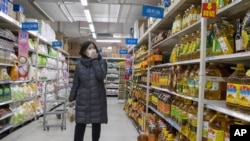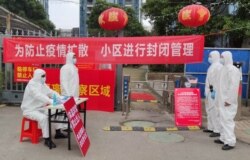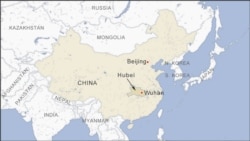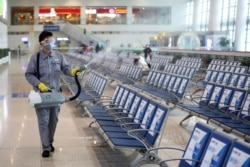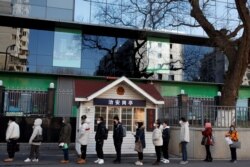Gazing out the window from his high-rise apartment in Huangshi, Hubei province, Zhao had the urge to jump off the building and end his life. He'd taken out a mortgage to buy his condo only a year ago.
Zhao, 28, worked as a sales representative for a plastic surgery hospital in Shanghai, with a monthly income of over 10,000 yuan, or about $1,500, the average in China's major cities.
Zhao, who asked VOA to identify him only with his surname, returned to his hometown Huangshi to celebrate the Lunar New Year in January, but was trapped there by the sudden outbreak of the novel coronavirus.
On New Year's Eve, the second day of the lockdown that began for Wuhan on January 23, authorities locked down Huangshi, a city about 60 miles southeast of Wuhan with a population of about 2.5 million. On that day, 13 cities in Hubei province entered lockdown mode.
In China, where few believe the official figures for cases, recoveries and deaths, Zhao seems to have escaped the telltale shortness of breath marking the onset of COVID-19, only to be suffocated by the pressure of life.
Since February 10, some provinces and industries in China have gradually resumed work. No one knows when that may happen in Hubei province, where as of Thursday, no new cases of the virus were reported. Wuhan remains locked down while restrictions elsewhere are easing.
One day at the end of February, Zhao received a WeChat message from his employer: "No need for you to return to work."
Zhao felt defeated.
"I'm really stressed out," he repeated over and over. "My mortgage costs me more than 3,000 yuan a month, and my car loan is more than 5,000 yuan."
Zhao could count exactly how much he had left in his account: 3,325 yuan and 83 cents, or $475 dollars.
"I'm so poor that I feel I've touched bottom," he said.
Zhao's parents are working-class people. Their monthly salary adds up to less than $1,500. The idea of letting them pay for his living expenses shames him.
"I'm 28 years old and I'm biting the old again," he told VOA, using Chinese slang for a boomerang child. "This psychological pressure is unbearable."
The one-two punch of domestic economic slowdown and the U.S.-China trade war have weakened the world's second-largest economy. Experts say China's economy could shrink for the first time since the 1970s.
This has made life particularly hard for ordinary people, as is true worldwide.
Zhao said many people are in his situation: They've lost their income because of the epidemic, but mortgages, car loans and other bills keep coming. At the same time, shortages caused by the epidemic mean people must buy expensive groceries. The result is families cannot make ends meet.
"People at the bottom are suffering the most," an audience member told VOA Mandarin via email. "Civil servants and people working for state enterprises don't have to worry, but small and medium-sized companies, as well as private companies, are miserable."
Data from the Chinese Ministry of Industry and Information Technology show that China has more than 30 million small and medium enterprises (SMEs) and more than 70 million self-employed people. One of them wrote to VOA about his experience.
He said in an email that he had planned to open a small shop in Nanjing, Jiangsu province, but now the city feels deserted. The neighborhood committee patrols the streets every day, and only shops with official permission are open.
"I am very anxious. My income has stopped, but my loss is rising every day. My heart is heavy," he wrote.
In his hometown in Jiangsu province, prices of vegetables and fruit are three to five times higher than before the epidemic started. Meat prices are skyrocketing. His parents are farmers, so the family can survive on their harvests for three or four months, but they have stopped eating meat.
Every day, Yu Quanhong, a retired employee of state-owned Wuhan Iron and Steel Co., busies herself comparing food prices on different online Groupon-style platforms. She tries to grab the best deal possible.
She has emptied one bank card since the lockdown, which was her travel fund. Yu said that although her pension wasn't affected by the epidemic, her financial situation is not as good as she would like.
"We're better off than the poorest, but overall, we are still quite poor," she said.
"We can't afford to get sick. We don't dare to go to the hospital. If nothing goes wrong, life is OK. If there is inflation, we would have difficulty coping," she added.
Yu opposes letting neighborhood committees distribute vegetables and meat. She said not only will it increase the risk of cross-infection, but it will also lead to corruption.
"The government should give us cash subsidies," she said. "I'd be happy if they can give each family 2,000 yuan ($285 USD) per month."
The epidemic has disrupted the lives of middle-class families who own businesses as well.
On March 4, China's state-run Xinhua News Agency quoted a survey by the China Association of Small and Medium Enterprises saying that nearly 90% of China's companies don't have enough capital to last for three months, and less than 10% can last more than half a year. Nearly half of the companies surveyed have plans to lay off staff.
The report said that in order to ease the pressure on SMEs, China has rolled out multiple subsidies, such as the periodic reduction of medical insurance premiums. Companies can apply for deferred payment of the housing provident fund. In addition, there are preferential policies such as reductions and exemptions of rents and utilities.
The rent and utility programs apply only to those who rent state-owned assets.
More than 1,000 kilometers from Wuhan, in Chengdu, Sichuan, Xie Junbiao, 39, has been back at work for more than a month. He earns more than 3,000 yuan, or $428, a month working in a food-processing plant.
Xie, the father of two, said, "We are not rich, nor do we have any power. To be frank, we are at the bottom of the society. If you don't work, you don't get paid."
For Zhao, now jobless, what's more devastating than being poor is not working. He searches and applies for jobs online, but once he reveals he's from Hubei, he's rejected.
"Basically, if you are from Hubei … it's like we all carry the virus."
Lin Yang contributed to this report from VOA's Mandarin service.
